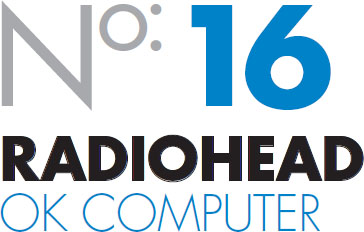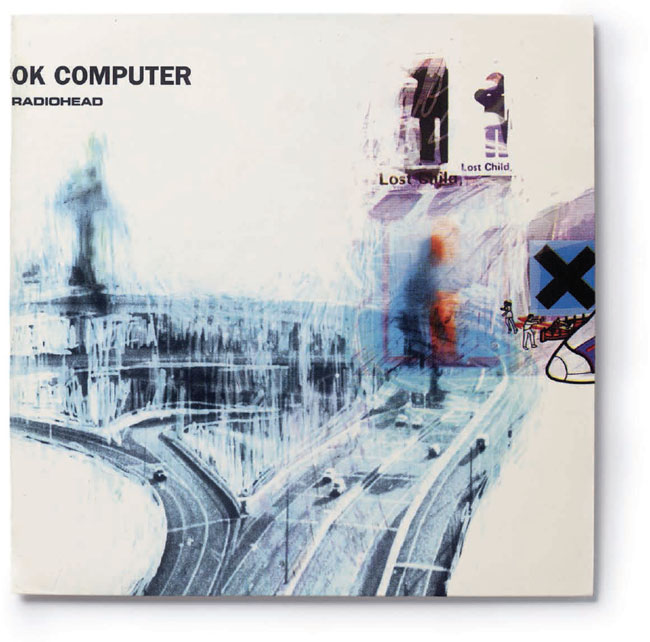
Parlophone
Produced by Radiohead and Nigel Godrich
Released: May 1997
TRACKLISTING
01 Airbag
02 Paranoid Android
03 Subterranean Homesick Alien
04 Exit Music (For a Film)
05 Let Down
06 Karma Police
07 Fitter Happier
08 Electioneering
09 Climbing Up the Walls
10 No Surprises
11 Lucky
12 The Tourist
With Radiohead’s magnificently dense third album, you have to put aside everything that came after its release. Forget the ecstatic, often hysterical critical acclaim, forget the placing of a generational touchstone upon these 13 tracks, and especially forget the band’s own discomfort and eventual disavowal of the cult of personality that sprang up around the record. OK Computer may have inspired the most depressing tour documentary ever made – Grant Gee’s Meeting People Is Easy – but when you strip away the suffocating accoutrements you’re left with the rock album that rebuilt the genre and propelled it towards the 21st century.
The English five-piece – singer and lyricist Thom Yorke, guitarists Jonny Greenwood and Ed O’Brien, bassist Colin Greenwood and drummer Phil Selway – had already come a long way on 1995’s The Bends, a collection of often riveting pocket symphonies for the guitar, which dived deep into the psyche of the group’s frontman. OK Computer accepted that record’s answers, but it asked completely different questions – it’s an album of savage observations where the world outside sits somewhere between a sci-fi novel and a soap opera (one of the many things the album predicts: ‘reality’ television), and the songs pinball between styles and movements. In lesser hands the record’s aims would have resulted in something embarrassing.

2000’s Kid A, the anguished and influential successor to OK Computer, would be simplistically hailed as the record where Radiohead went electronic, but it’s more fitting to describe OK Computer as an electronic album recorded with guitars. The band were already experimenting with electronics – the beat on the opening ‘Airbag’, a panoramic tune slowly discovering the arrangement’s gravity, is a brief snatch of Selway’s playing looped and edited – and if they didn’t know what buttons to push, they knew which strings to repurpose. The guitar sounds here change shape convulsively, and they’re cut together to create dissonance not grandeur.
There are moments of outright beauty, such as the glockenspiel-accentuated melody of ‘No Surprises’, but then the lyric captures a worn out firebrand’s descent into self-defeat and the preparation for suicide (‘a handshake of some carbon monoxide’). The outside world constantly intrudes and proves unfulfilling: the protagonist of ‘Subterranean Homesick Alien’ wishes a UFO and its occupants would snatch him away from the everyday, but he knows that even if that happened he’d just be derisively dismissed by his friends and family. ‘They’d shut me away,’ Yorke shrugs.
The vocalist sees the world as a dystopia that has come to pass without anybody realising. The stark, nightmarish landscape of ‘Climbing Up the Walls’ captures the interior reality of a serial killer, building to a bleak crescendo, while ‘Let Down’, underpinned by an assertive bass figure, captures the feeling of travelling without pause until you’re anaesthetised to your surroundings. These ideas would attract comparisons to Pink Floyd, but Yorke didn’t see himself as a redemptive figure or selfaware seer. He was more likely to identify with the office drones trapped in ‘Karma Police’.
OK Computer could find sweetness in its most savage moment, and soil beauty with selfishness or consumerism gone mad. But its condemnations are arresting, such as the ‘kicking squealing Gucci little piggy’ of the whiplash-inducing suite, ‘Paranoid Android’, and the album’s outgoing nature – full of songs about flawed transactions, a theme enhanced by the artwork – brought listeners along with it. It found a sense of equilibrium with the hymn-like sunset of ‘The Tourist’, and it didn’t just dismantle your life and the assumptions behind it into pieces, it put them back together. OK Computer was ultimately liberating.